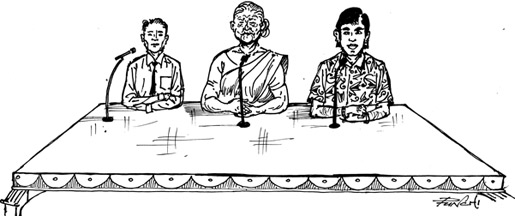"Judge not and you shall not be judged"
By Dr. Wilfrid Jayasuriya
So judges too at book contests are not immune from this dictum from
the New Testament. Recently and, in previous times too, audiences at
book judging contests have criticised the choices.Is there some
authentic basis for disagreeing with the judges. I do think so. Judges
are driven by the need to satisfy not only literary criteria (if such
exist as objective yardsticks, which they don't) but also the audiences
before whom they make their judgements.
Thus over the few years that book contests have been promoted judges
were naturally prone to satisfy the local audience, which they judge to
be filled with the echoes of the major public events that have filled
the public mind. These of course include the Tamil/Sinhala issue.
If one could statistically identify the themes that dominate the
books shortlisted in book contests, themes which naturally find an echo
in the heart of the local audience, you might find that more than half
the short- listed books dealt with that issue and more than half the
winners also dealt with that issue.
 It's
easy to find a response to a story or essay which currently engages the
minds of the audience. The judges feel themselves justified in
preferring the theme of public concern because that is what the public
(according to the predisposition of the judges) want. At the same time
the writers who write on this "eternal theme" have a ready- made
response from the audiences they assume to be there, and so there isn't
much need for artistry, innovation and in depth inquiry on the side of
the suppliers of such content. Aren't the judges who sit in judgement
similarly conditioned since they too are in the same context? Both
writer/ supplier and It's
easy to find a response to a story or essay which currently engages the
minds of the audience. The judges feel themselves justified in
preferring the theme of public concern because that is what the public
(according to the predisposition of the judges) want. At the same time
the writers who write on this "eternal theme" have a ready- made
response from the audiences they assume to be there, and so there isn't
much need for artistry, innovation and in depth inquiry on the side of
the suppliers of such content. Aren't the judges who sit in judgement
similarly conditioned since they too are in the same context? Both
writer/ supplier and
judge are in the situation of the ready-made response and because of
that will anyone contest the judgements? It's somewhat like the "best
seller" criterion used by the American reader and publisher.
To make this point of view with a little more punch and effectiveness
I will take a single example of a book which dealt with the Sinhala/Tamil
issue and was not selected as winner. That was "The Road to Elephant
Pass" which did not evoke stock responses on the ethnic issue. There
were no blood, sweat and tears stuff but controlled and modulated
feelings. The book was rejected by the judges and had to be re-submitted
by the publisher in the subsequent year, when it was finally chosen.
Can one doubt its artistry? But it arouses the hackles of the
proponents of the two communities because both hero and heroine are
"traitors" to their race and therefore do not arouse the stock
responses.
At the short listing event at the British Council, which took place
on Monday this week, there were two novels again which dealt with the
Sinhala/Tamil theme. In one the Tamil characters are the victims of the
IPKF and in the other a Sinhala speaking Tamil is shot by Sinhalese
soldiers bent on revenge for the death of their comrades. Both these
stories are dependent on existing responses among the readers (including
the judges who present them to readers). Do these leave room for other
thoughts and other contexts?
I am reminded of an experience I had teaching undergraduate rhetoric
and composition in the USA in the early 1990s. An adult black student
was presenting a succession of papers dealing with the black issue. It
did not matter that the paper was narrative of a remembered event, or a
portrait of a remembered person, or a comparison and contrast paper.
All of them were about the "blacks and their problems." Since I was
not one of the "whites" I told him "Why don't you write on another
topic?"
After some discussion he agreed. When he submitted his next paper I
was eager to read it and I found that again the subject was the same. I
told him "WHY?". He said.
"That's what fills my mind." "But does it help you to learn to
write?" I said.
|

